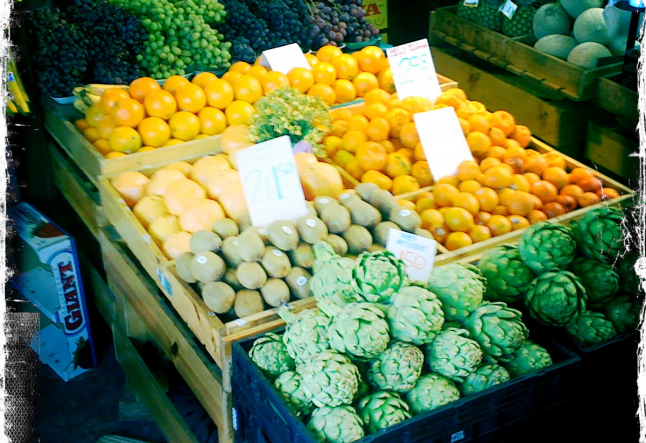organic wonders abound

the farmer’s market organic paradise
Every Sunday morning after we walk our dog, make our juice and eat breakfast, my husband and I pack up our daughter, our cloth bags and our market cart and head off to the farmer’s market to do the shopping for the week.
We love this market and it has been my Sunday ritual for years, even before I was a wife and mom. Already at 8 am, the market is alive with hustle and bustle. Organic and natural produce stands line the streets. There are live bluegrass and jazz bands and a few other staple solo musicians who round out the soundtrack for this weekly ritual.
The intermingled aromas of homemade tamales, baked goods, kettle corn, candles and bath products waft across our path as we wander through the rows of stalls. My daughter sits in her stroller with joy as her eyes, ears, nose and mouth feast on the vivid colors, cacophonous sounds, inviting smells and delicious tastes she encounters.
I love this market not only for its charm, but most importantly it gives us the opportunity to connect with the people who grow the food we prepare and eat.
It gives us the opportunity to have a deeper relationship with the food that is produced through the labor of these farmers and purveyors. The food here is organic or naturally grown, without the use of pesticides or man-made chemicals. The land on which the work is done is respected and honored. They sow and reap with the seasons.
Over the last few years, especially since I became pregnant, organic food has become a passion and perhaps a little bit of an obsession, which has extended not only to organic but locally grown organic food.
This is what I have learned about organics over the last few years: Cows that produce organic milk are free of synthetic growth hormones and pesticides. Babies today are being born with over 187 toxic chemicals in their blood streams, many of them from herbicides, pesticides and fungicides traced back to their mothers.
Men who eat food that is not organic are found to have a smaller sperm count and less active libido than men who eat organic food. Organically grown produce can be higher in nutritional value and can contain more anti-oxidants than conventionally grown food. Organic farming respects and preserves water resources. As a matter of fact, organic farming is good for soil fertility, biodiversity and our planet’s climate. Organic food simply tastes better and it doesn’t have to be expensive.
Just go to the farmer’s market and you’ll see. In my mid-twenties, when organics was just becoming popular and I was curious, I would go armed with only a twenty-dollar bill. I would leave with bags of salad, avocados, pounds of peaches, baskets of strawberries, herbs, a bag of green beans, figs, onions, leeks, dates and a jar of honey, a bounty to say the least. Today that kind of money will still take you pretty far.
Sure, there are critics who poo poo the organic food industry. Apparently the industry is having a hard time meeting the supply because the demand is too high. According to Business Week, companies like Stonyfield Farms now have to import supplies from far away places like New Zealand. In my opinion, I could not be happier.
I would rather drink organic milk from New Zealand than milk laced with bovine growth hormones and pesticides. I believe that with change there comes discomfort and growth. We should have the right to pure, unadulterated food. I believe the health of our children and much of the future of this planet depends on organic farming.
If you can start off with only a few items in your shopping cart, like organic peanut butter, apples or bell peppers, you are off to a great start. Their conventional counterparts are some of the most common pesticide-laced items. Other conventional produce items that are best to shy away from include strawberries, celery, peaches, cherries, Mexican cantaloupe, spinach and green beans.
The Organic Center for Education is a nonprofit organization whose mission is to educate the public through science about why organic is simply better for you and the planet. They have a campaign called Mission Organic, which is focused on encouraging consumers to commit to purchasing one organic item in every 10 that they purchase from their local market. Their intention is to increase the current market share of two percent organic goods to ten percent by 2010. If we as consumers demonstrate a demand, supply will follow. Make it your New Year’s resolution to go organic.
Organic resources:
organic-center.org – sign up for Mission organic
localharvest.org – find locally grown produce anywhere in the country
Anna Getty is a Kundalini yoga at teacher at Goldenbridge and creator of The Divine Mother pre and post-natal yoga workout.